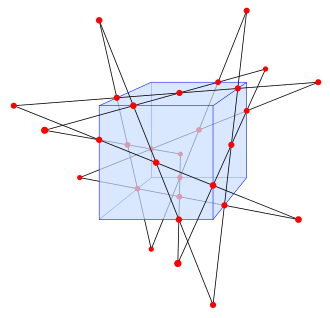Schläfli double six
In geometry, the Schläfli double six is a configuration of 30 points and 12 lines, introduced by Schläfli (1858, p.115). The lines of the configuration can be partitioned into two subsets of six lines: each line is disjoint from (skew with) the lines in its own subset of six lines, and intersects all but one of the lines in the other subset of six lines. Each of the 12 lines of the configuration contains five intersection points, and each of these 30 intersection points belongs to exactly two lines, one from each subset, so in the notation of configurations the Schläfli double six is written 125302.

Construction
As Schläfli showed, the double six may be constructed from any five lines a1, a2, a3, a4, a5, that are all intersected by a common line b6, but are otherwise in general position (in particular, each two lines ai and aj should be skew, and no four of the lines ai should lie on a common ruled surface). For each of the five lines ai, the complementary set of four out of the five lines has two quadrisecants: b6 and a second line bi. The five lines b1, b2, b3, b4, and b5 formed in this way are all in turn intersected by another line, a6. The twelve lines ai and bi form a double six: each line ai has an intersection point with five of the other lines, the lines bj for which i ≠ j, and vice versa.
An alternative construction, shown in the illustration, is to place twelve lines through the six face centers of a cube, each in the plane of its face and all making the same angles with respect to the cube's edges.
Related objects

A generic cubic surface contains 27 lines, among which can be found 36 Schläfli double six configurations. The set of 15 lines complementary to a double six, together with the 15 tangent planes through triples of these lines, has the incidence pattern of another configuration, the Cremona–Richmond configuration.
The intersection graph of the twelve lines of the double six configuration is a twelve-vertex crown graph, a bipartite graph in which each vertex is adjacent to five out of the six vertices of the opposite color. The Levi graph of the double six may be obtained by replacing each edge of the crown graph by a two-edge path. The intersection graph of the entire set of 27 lines on a cubic surface is the complement of the Schläfli graph.
References
- Hilbert, David; Cohn-Vossen, Stephan (1952), Geometry and the Imagination (2nd ed.), New York: Chelsea, ISBN 978-0-8284-1087-8
- Schläfli, Ludwig (1858), Cayley, Arthur (ed.), "An attempt to determine the twenty-seven lines upon a surface of the third order, and to derive such surfaces in species, in reference to the reality of the lines upon the surface", Quarterly journal of pure and applied mathematics, 2: 55–65, 110–120